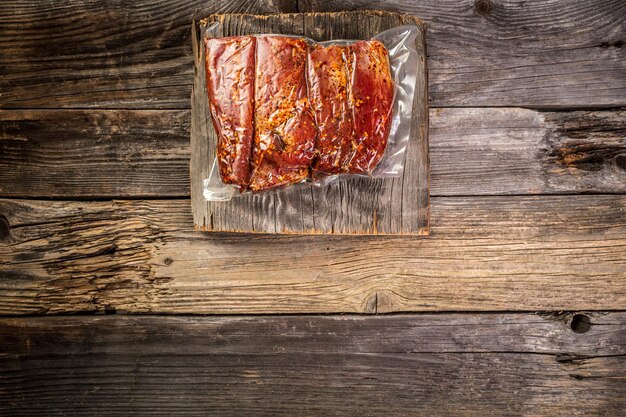How Long Can You Keep a Brisket in the Refrigerator?
When it comes to savoring a well-cooked brisket, timing is everything. From preparation to the moment it hits your palate, every step is crucial, including storage. Proper storage not only preserves the brisket's flavors and textures but also ensures it remains safe to eat. Whether you've prepared a delicious smoked brisket for a family gathering or are simply planning meals ahead, knowing how long can a brisket stay in the refrigerator can save you from potential food waste and health risks. Let's explore the ins and outs of brisket storage, practical tips, and the science behind keeping your brisket fresh.
Understanding Brisket: A Quick Overview
What Is Brisket?
Brisket is a cut of meat from the lower chest of beef or veal. Known for its tenderness and rich flavor when cooked properly, brisket is a staple in many cuisines. The slow cooking processes, such as smoking or braising, break down the tough connective tissues, transforming the brisket into a melt-in-your-mouth delicacy.
Why Is Storage Important?
When you store brisket correctly, you maintain its quality and safety. Failure to store it properly can lead to spoilage quicker than you might expect, possibly resulting in an unfortunate encounter with foodborne illnesses. This is why understanding refrigeration guidelines is essential.
How Long Can Raw and Cooked Brisket Stay in the Refrigerator?
The longevity of brisket in the fridge is contingent on several factors, including its state—raw or cooked—and the conditions under which it's stored.
Raw Brisket
For raw brisket, it's important to refrigerate it promptly. Generally, raw brisket can remain refrigerated for 3 to 5 days. During this period, ensure your fridge is set at or below 40°F (4°C) to prevent bacterial growth. If you're not planning to cook it within this window, consider freezing your brisket for extended shelf life.
Cooked Brisket
Once cooked, brisket enjoys a slightly longer stay in the refrigerator. Cooked brisket can be safely stored for 3 to 4 days. To maximize its lifespan, store it in airtight containers or tightly wrapped in aluminum foil or plastic wrap. This not only safeguards against spoilage but also prevents the brisket from absorbing other refrigerator odors.
Signs of Brisket Spoilage
Understanding the signs of spoilage can prevent the unpleasant surprise of a ruined brisket:
- Odor: A sour or off smell indicates spoilage.
- Color: Any significant discoloration or a change to green or grayish hues.
- Texture: Slimy or sticky surfaces can signal bacterial growth.
If any of these signs appear, it's best to err on the side of caution and not consume the brisket.
Tips for Extending Brisket's Shelf Life in the Fridge
Opt for Proper Packaging
Packaging plays a pivotal role in how long your brisket stays fresh:
- Airtight Containers: These are perfect for sliced portions, helping retain moisture and flavor.
- Vacuum Sealing: This method removes air, which can drastically extend shelf life.
- Wrap Tightly: Use aluminum foil or plastic wrap to cover the entire piece if no airtight container is available.
Utilize the Coldest Part of Your Fridge
To keep your brisket at its best:
- Store it in the coldest part of the fridge, often at the rear. This reduces the risk of temperature fluctuations.
- Keep it away from the fridge door, where temperatures can vary significantly.
Quick Cooling
After cooking, allow the brisket to cool for no more than two hours before refrigerating it. Quick cooling is crucial to prevent bacterial growth during the cooling period.
When to Consider Freezing Your Brisket
Freezing is an excellent option if you anticipate not consuming your brisket within the refrigeration window. Here's what you need to know:
Freezing Guidelines
- Raw Brisket: Can be frozen for 6 to 12 months.
- Cooked Brisket: Can last 2 to 3 months in the freezer without a noticeable change in quality.
Ensure the brisket is well-wrapped in heavy-duty aluminum foil or placed in high-quality freezer bags to prevent freezer burn.
Thawing Tips
When ready to enjoy your frozen brisket, it's best to thaw it in the refrigerator rather than at room temperature. This slow thawing method ensures even temperature distribution, preserving texture and taste.
Practical Brisket Utilization Ideas
To minimize waste and enhance your meals, consider these meal ideas and storage practices:
Meal Prepping
Using cooked brisket in meal prepping can save time and add convenience:
- Tacos and Sandwiches: Brisket makes an excellent filling. Store pre-shredded or sliced portions for quick meal assembly.
- Salads and Bowls: An easy addition to any salad or grain bowl for a protein boost.
- Brisket Chili or Stew: Use leftover brisket as a base for a hearty warm dish.
Portion Control
Divide your brisket into portions before storing it, especially if it’s a large cut. This makes it easier to use only what you need, reducing the risk of repeated cooling and reheating, which can degrade quality.
Summary Table: Brisket Storage Guidelines 📋
| State of Brisket | Refrigeration Lifespan | Freezing Lifespan | Storage Tips |
|---|---|---|---|
| Raw | 3-5 days | 6-12 months | Store in the coldest part, use airtight packaging |
| Cooked | 3-4 days | 2-3 months | Allow quick cooling, wrap tightly |
Final Insights on Brisket Preservation
In the realm of food storage, brisket stands out with its specific needs. Mastering the art of brisket storage not only enhances your culinary experience but also ensures every bite is a safe delight. By adhering to these guidelines, you can savor your brisket with the peace of mind that comes from knowing it's both delicious and safe to enjoy. Whether you're a brisket novice or a seasoned pro, effective storage practices empower you to make the most of this flavorful meat, ensuring no slice goes to waste.

